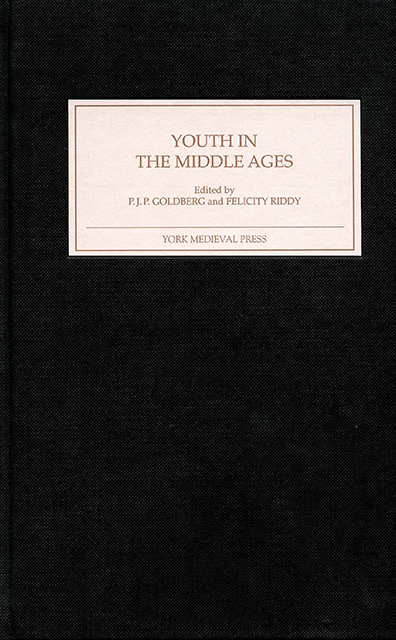Book contents
- Frontmatter
- Contents
- List of Contributors
- Introduction: After Ariès
- Childhood and Youth in the Early Middle Ages
- Jewish Society under Pressure: The Concept of Childhood
- Desiring Virgins: Maidens, Martyrs and Femininity in Late Medieval England
- Out of the Mouths of Babes: Authority in Pearl and in Narratives of the Child King Richard
- A Safe-Haven for Children? The Early Humiliati and Provision for Children
- Migration, Youth and Gender in Later Medieval England
- Good Advice on Leaving Home in the Romances
- ‘Youth on the Prow’: Three Young Kings in the Late Viking Age
- Index
- York Medieval Press: Publications
Jewish Society under Pressure: The Concept of Childhood
Published online by Cambridge University Press: 25 March 2023
- Frontmatter
- Contents
- List of Contributors
- Introduction: After Ariès
- Childhood and Youth in the Early Middle Ages
- Jewish Society under Pressure: The Concept of Childhood
- Desiring Virgins: Maidens, Martyrs and Femininity in Late Medieval England
- Out of the Mouths of Babes: Authority in Pearl and in Narratives of the Child King Richard
- A Safe-Haven for Children? The Early Humiliati and Provision for Children
- Migration, Youth and Gender in Later Medieval England
- Good Advice on Leaving Home in the Romances
- ‘Youth on the Prow’: Three Young Kings in the Late Viking Age
- Index
- York Medieval Press: Publications
Summary
Social attitudes towards children are an important means towards understanding the past. It is through the procreation of children that a society seeks to perpetuate itself. Securing this continuity is thus one of the most important goals of any society. By examining attitudes towards children and childhood we are presented with a tool which allows us to expose the social values and aspirations, the weight of a society’s fears and pressures and its basic rules and norms. The question of attitudes towards children and childhood was raised by Philippe Ariès’s book Centuries of Childhood, first published in French in 1960. Ariès argued that throughout the Middle Ages, and up until the seventeenth century, the concepts of childhood and family were very differently understood from those which developed subsequently. In his opinion, prior to the seventeenth century children were not recognized as entities separate from adults and were in fact perceived to be merely ‘small adults’. Avariety of reactions, both positive and negative, followed the publication of Ariès’s theory. These served to place the topics of children and childhood at the forefront of historical research, just as they are in the fields of psychology, sociology, and anthropology. This paper will examine the place of children in Jewish society of northern France and Germany during the twelfth and thirteenth centuries in the light of the debate about Ariès’s thesis.
During the Middle Ages the Jewish group in Christian countries perceived itself to be threatened by the Christian society that surrounded it. The threat was multi-faceted and stemmed among other things from the knowledge that Christians could and did convert Jews to Christianity by force, by inducement, or by persuasion. In the long era of persecution and forced expulsion following the first Crusade of 1096, Jews as a community concluded that Christians intended to focus their missionary efforts particularly on Jewish children. This concern of the Jews was predicated on active attempts by both ecclesiastical and lay authorities to take control of Jewish children. For example, in 1497 in Portugal all Jewish children were forcibly baptized, undoubtably as a preliminary to baptizing their parents.
- Type
- Chapter
- Information
- Youth in the Middle Ages , pp. 25 - 44Publisher: Boydell & BrewerPrint publication year: 2002
- 1
- Cited by



